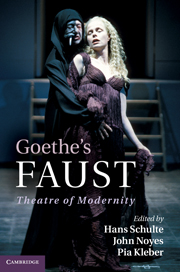Book contents
- Frontmatter
- Contents
- List of illustrations
- List of contributors
- Preface
- List of abbreviations
- Introduction
- PART I MODERNITY
- PART II THEATRE
- 13 Goethe's Faust: theatre, meta-theatre, tragedy
- 14 Faust beyond tragedy: hidden comedy, covert opera
- 15 Theatricality and experiment: identity in Faust
- 16 Rhetorical action: Faust between rhetoric, poetics and music
- 17 Directing Faust: an interview
- 18 A contradictory whole: Peter Stein stages Faust
- 19 Re-thinking and staging Goethe's Faust at the State Theatre Stuttgart 2005–6
- 20 Strehler's Faust in performance
- Select bibliography
- Index
13 - Goethe's Faust: theatre, meta-theatre, tragedy
Published online by Cambridge University Press: 01 June 2011
- Frontmatter
- Contents
- List of illustrations
- List of contributors
- Preface
- List of abbreviations
- Introduction
- PART I MODERNITY
- PART II THEATRE
- 13 Goethe's Faust: theatre, meta-theatre, tragedy
- 14 Faust beyond tragedy: hidden comedy, covert opera
- 15 Theatricality and experiment: identity in Faust
- 16 Rhetorical action: Faust between rhetoric, poetics and music
- 17 Directing Faust: an interview
- 18 A contradictory whole: Peter Stein stages Faust
- 19 Re-thinking and staging Goethe's Faust at the State Theatre Stuttgart 2005–6
- 20 Strehler's Faust in performance
- Select bibliography
- Index
Summary
In this chapter I want to stress two matters in particular. One is that there is an omnipresence of abundant, kaleidoscopic theatricality in Goethe's Faust project. The other is that that theatricality is not simply decoration, not simply (as it were) icing on the cake, but is, rather, germane to the central concerns of the drama. Whether we read Faust as a philosophical drama, as a drama of desire or as the historical drama of modernity (and it is to this aspect that I wish to pay particular attention), at every turn we find that the theatrical statement is the correlative of the theme.
Let me begin with somewhat personal and anecdotal rather than scholarly concerns. On two occasions I have been involved in directing students of German at University College, London in theatre productions of Goethe's Faust. We performed an acting version of both parts. What resulted was a three-act drama. At its centre was the so-called Gretchentragödie, the love story of Faust and Margarete. This was our Act 2. It was preceded by the material that is often referred to as the Gelehrtentragödie – the tragedy of the despairing scholar – which extends, in Goethe's Part i, from the opening monologue of Faust's lacerating despair, through the wager with Mephisto, to Faust's rejuvenation in the ‘Witch's Kitchen’. This constituted our Act 1.
- Type
- Chapter
- Information
- Goethe's FaustTheatre of Modernity, pp. 197 - 208Publisher: Cambridge University PressPrint publication year: 2011

